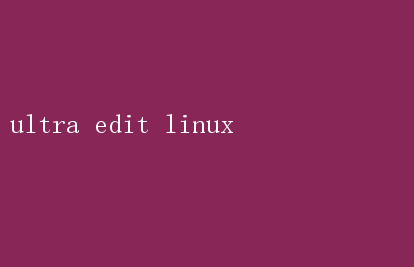
UltraEdit for Linux: A Powerhouse Text Editor for Linux Users
In the realm of text editors, UltraEdit stands as a towering figure, renowned for its versatility, robustness, and sheer power. While UltraEdit has long been a staple for Windows users, its introduction to the Linux platform has marked a significant milestone, catering to the needs of an ever-growing community of Linux enthusiasts. This article delves into the myriad features, benefits, and use cases of UltraEdit for Linux, making a compelling argument for why it should be your go-to text editor.
Introduction to UltraEdit
UltraEdit is a commercial text editor with a rich history spanning over three decades. Initially released in 1989, it has evolved from a humble text editor into a fully-fledged Integrated DevelopmentEnvironment (IDE) with extensive support for programming languages, code highlighting, syntax folding, and more. Its intuitive interface, combined with an extensive array of features, has earned it a loyal following among developers, sysadmins, and anyone who deals with text files on a daily basis.
UltraEdits transition to Linux is a testament to its developers commitment to catering to a diverse user base. Linux, known for its flexibility, robustness, and open-source nature, has always been a platform where users seek powerful yet customizable tools. UltraEdit for Linux brings all the goodness of the Windows version, wrapped in a Linux-native package that integrates seamlessly with the Linux ecosystem.
Key Features of UltraEdit forLinux
1. Intuitive and Customizable Interface
UltraEdit for Linux boasts an intuitive interface that is bo
